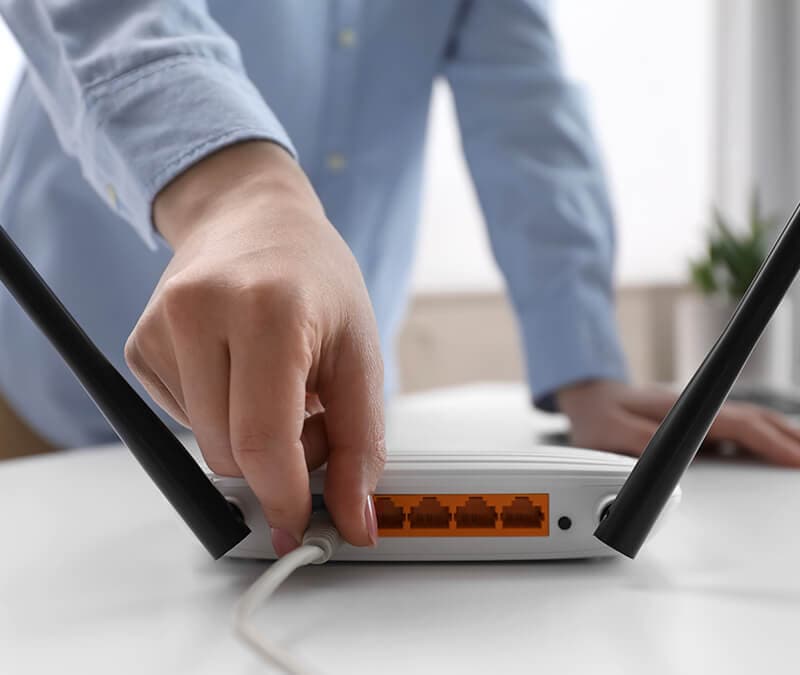What is a router, and how does it work?
A router is a device that communicates between the internet and the devices in your home that connect to the internet. As the name implies, a router “routes” internet traffic between connected devices and the internet. Keep reading to find out how routers work, the different types of routers available, and what to look for when shopping for a router. Then, get a VPN to help keep the data you send and receive online private.

A router is a key part of your home’s internet network. Thanks to it, your laptop, smartphone, smart TV, and other devices can connect to your home Wi-Fi.
With the right kind of router, you can enjoy faster internet speeds, help protect your family from cyberthreats and hackers, and avoid those maddening Wi-Fi dead spots.
You don’t have to be a computer genius to know what kind of router you need. Simply understanding the basics — such as a router definition and knowing what does a router do — will help you choose the right equipment for your home network.
How do routers work?
A typical home has a range of internet-connected devices — personal computers, tablets, smartphones, printers, thermostats, smart TVs, and more. Thanks to your router, these devices form a network. Your home router directs incoming and outgoing internet traffic on that network in the fastest and most efficient way.
The information traveling on your home network could be an email, a movie, or a live feed from your baby cam, each of which takes up varying amounts of bandwidth. Making sure that information is delivered quickly and correctly is a big task — and getting bigger. As you add more and more devices — think Internet of Things — you are constantly asking your router to do more.
How modems differ from routers
What is a router vs. a modem? It’s easy to get a router confused with a modem. But these two devices have very different jobs. In fact, without a modem, all you’d have is your local network with no way to connect to the internet.
The modem’s job is to bring the internet service from your provider — often a cable or phone company — into your home. This service then connects to your router, which delivers internet connectivity to your home network.
When most internet service were was delivered over telephone lines — better known as dial-up internet — modems enabled communication between the digital devices in your home and the analog signals used on telephone lines. With higher-speed internet connections, including cable and satellite, modems play a similar but different role.
What are the different types of routers?
When it comes to routers, there are only two types you’ll need to consider:
- Wireless routers. A wireless router connects directly to a modem by a cable. This allows it to receive information from — and transmit information to — the internet. The router then creates and communicates with your home Wi-Fi network using built-in antennas. This provides all the devices on your home network with internet access.
- Wired routers. A wired router connects directly to computers through wired connections. They usually have a port that connects to the modem to communicate with the internet. Another port — or ports — allows the wired router to connect to computers and other devices to distribute information.
What to look for in a router
Most internet service providers (ISPs) give you a router and a modem — or a combination of the two — for a subscription fee that you typically pay each month. These routers may not be the best fit for your usage, so you might consider purchasing one that works better for your needs. Before buying a router, here are a few things to look for.
Wi-Fi coverage
Wi-Fi signals within a home largely depend on the size of the home and the barriers that prevent signals from reaching their destinations. Fireplaces, mirrors, and thick walls are just a few common obstacles that block Wi-Fi signals. Look for a router that has the capability to reach the far corners of your home. Also, look for one that has a mesh network — a system that uses a main router and a series of additional routers — to boost and extend the Wi-Fi capabilities across a home.
Wi-Fi performance
Router technology has changed over time. Make sure you have a router that uses the latest technology and has updated firmware. MU-MIMO is one such new technology. It stands for multi-user, multiple-input, multiple-output technology. It allows Wi-Fi routers to communicate with multiple devices simultaneously. This decreases the wait time and improves network speed.
Wi-Fi security
Cybercriminals can access your home network and install malware and viruses in your devices. They can also spy on the information you are sending through email and the files you download. Clever hackers can even crack your home Wi-Fi network to snatch your password and log-in information to your online bank accounts and credit card portals.
Hackers work with an arsenal of tools to do this. Having a router that provides network-level protection could help block cyberattacks at the port of entry. Look for a router that has built-in security features like automatic updates, device quarantine, and signed firmware updates. The more protection, the better.
Then, add an extra layer of protection with a VPN that encrypts the data you send and receive online and helps keep your personal information private.
Wi-Fi controls
Routers have become a very important part of the connected home. Make sure you buy a router that you can control easily. The latest routers are easy to install and use. Some come with user-friendly apps that help you with guest networks, parental controls, user time limits, and network management.
Whether you are setting up a new router in your home or upgrading an existing one, make sure you get to know all the workings of your new router and if it is designed to meet your needs.
Router FAQs
What does a router do?
A router connects devices such as your laptop, tablets, smartphones, and smart TV to your home internet network. Without it, your devices would not be able to connect to the internet.
Is a router the same as a modem?
No. Your Internet Service Provider – often a cable or phone company – will provide you with both a modem and a router. The modem is the device that brings internet service from your provider to your home. The router then allows your devices to connect to this internet service.
Where do you get a router?
Your Internet Service Provider, which is often a cable or phone company, will send you a router after you order your internet service. You can also shop around for a router on your own if you prefer an alternative type.
What barriers might hamper your Wi-Fi signal?
The placement of your router can play an important role in how strong your internet connection is and whether you encounter connectivity dead spots. That’s because fireplaces, mirrors, and thick walls are just a few common obstacles that can block Wi-Fi signals. Make sure, then, to place your router so that these barriers don’t impede your connectivity.
What is a mesh network?
With a mesh network, you’ll have one main router and additional satellite routers that you can place throughout your home. This type of set-up will boost the strength of your Wi-Fi signal and help avoid connectivity dead spots.
Can a router help protect you from hackers?
Yes. Cybercriminals that crack your home Wi-Fi could spy on your online activity or flood your devices with malware. Investing in a router that provides network-level protection could help block cyberattacks at the port of entry. Look for a router that has built-in security features like automatic updates, device quarantine, and signed firmware updates.
Your home network is only as secure as its weakest link. Give all your devices the ironclad protection they need with Norton 360 Deluxe, an all-encompassing privacy and security suite that will help block hackers and prevent malware. Plus, it features a built-in VPN to encrypt your online connection and help keep your internet activity private.
Editorial note: Our articles provide educational information for you. Our offerings may not cover or protect against every type of crime, fraud, or threat we write about. Our goal is to increase awareness about Cyber Safety. Please review complete Terms during enrollment or setup. Remember that no one can prevent all identity theft or cybercrime, and that LifeLock does not monitor all transactions at all businesses. The Norton and LifeLock brands are part of Gen Digital Inc.






Want more?
Follow us for all the latest news, tips, and updates.